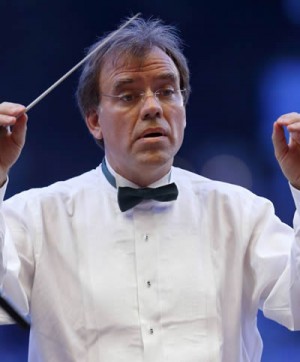Boston Landmarks Orchestra opens summer season with “The Planets,” world premiere

Christopher Wilkins conducted the Boston Landmarks Orchestra Wednesday night at the DCR Hatch Bandshell.
The Boston Landmarks Orchestra and conductor Christopher Wilkins paid tribute to the hundredth anniversary of Gustav Holst’s The Planets Wednesday night. The event, at the DCR Hatch Memorial Shell, was part of the season-opening program of free summer concerts on the Esplanade.
The seven-movement astrological suite, of course, does not need this centennial year to be heard more frequently. Today–as in the composer’s own time–The Planets stands as Holst’s most visible achievement, unfortunately eclipsing his other works. Yet despite its popularity, the suite had an inauspicious beginning. The premiere in London’s Queen’s Hall led by Adrian Boult in September 1918 was thrown together at the last minute. Holst was even forced to draw upon singers from the St. Paul’s Girls’ School where he taught for the wordless female chorus in the final movement, “Neptune.” The first performance was also incomplete, and the full suite wasn’t heard until 1920.
Wednesday night’s performance paid special homage to the premiere as the Landmarks Orchestra welcomed the Paulina Voices, the fine all-female chorus from the same St. Paul’s Girls’ School in London, to the Hatch Shell. With a svelte vocal blend, the singers brought the sound of faint light to “Neptune” as Wilkins coaxed orchestral harmonies that evaporated into prismatic vapors.
The Landmarks Orchestra, in fact, sounded as good as it ever has. Leading with broad gestures and brisk tempos, Wilkins sculpted languid lines and drew plush textures from the ensemble in “Venus”; Kevin Owen’s horn solo floated smoothly over the accompanying flutes and clarinet phrases. The theme of “Mercury” unfolded from the orchestra’s dusky basses and bassoons to the violins’ glistening upper register. In “Jupiter,” Landmarks’ dark-toned brass section added subtle weight to the jocular music.
Elsewhere the playing and Wilkins’ direction yielded electrifying results. The pompous march of “Saturn”emerged in powerful, precision-cut phrases. “Mars” moved with urgency, though Wilkins drew out the conclusion for dramatic effect. The snarling fanfares of “Uranus” galumphed appropriately and pulsed with impish glee.
Pegasus Promenade, a new work by composer Gonzalo Grau and the young students of East Boston’s youth program ZUMIX, was heard in its world premiere.
Cast in four movements and spanning fifteen minutes, Pegasus Promenade takes Holst’s Planets as its inspiration. Lyrics and music written by Tayler Fernandez Núñez, Rehanna Fernandez Núñez, Jennifer Perez, and Eleasah Whittaker leave vivid images of galaxies and constellations in the mind, and Grau’s orchestrations wrap the songs in vibrant textures, having the tuneful appeal of a film score. The attractive sonorities are combined in strange yet familiar ways.
The composers of this collaborative suite of songs took turns singing and playing an electric piano, spinning out a pop-style sequences that were complemented by Landmarks’ winds and strings. The brief parts for wordless female chorus, sung by the Paulina Voices, resulted in harmonies that glistened like moonlight on water. The percussionists of ZUMIX, playing all sorts of bells and drums, churned out driving African polyrhythms for a zesty, propulsive ending. Together, the combined ensembles gave Pegasus Promenade bold advocacy.
Much of the concert’s first half was devoted to light classical favorites. The Paulina Voices, led by Heidi Pegler, delivered Lyn Williams’ short Festive Alleluiah with energy and gleaming tone. A short encore, Andy Beck’s Something Told the Wild Geese, featured the singers in even more delightful moments of silvery sound and clear diction.
Wilkins led the Landmarks Orchestra in André Caplet’s orchestration of Debussy’s Clair de lune, bringing out its cool, colorful lines. Leroy Anderson’s Summer Skies, with its Wagnerian heft, brought moments of tender warmth. And the Edwardian swagger of Elgar’s Pomp and Circumstance March No. 1 set the air spinning in a grand opening to Landmarks’ summer season.
The Boston Landmarks Orchestra will host the Boston University Tanglewood Institute Young Artists Wind Ensemble and Orchestra in music by Bernstein and Stravinsky 7 p.m. July 25 at the DCR Hatch Memorial Shell. landmarksorchestra.org
Posted in Performances